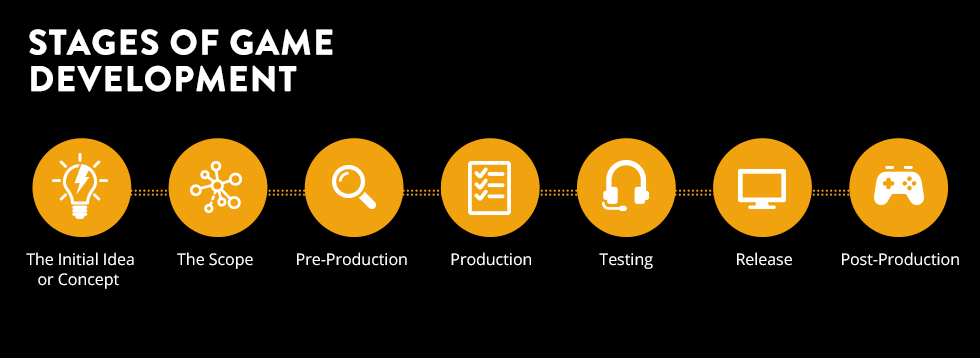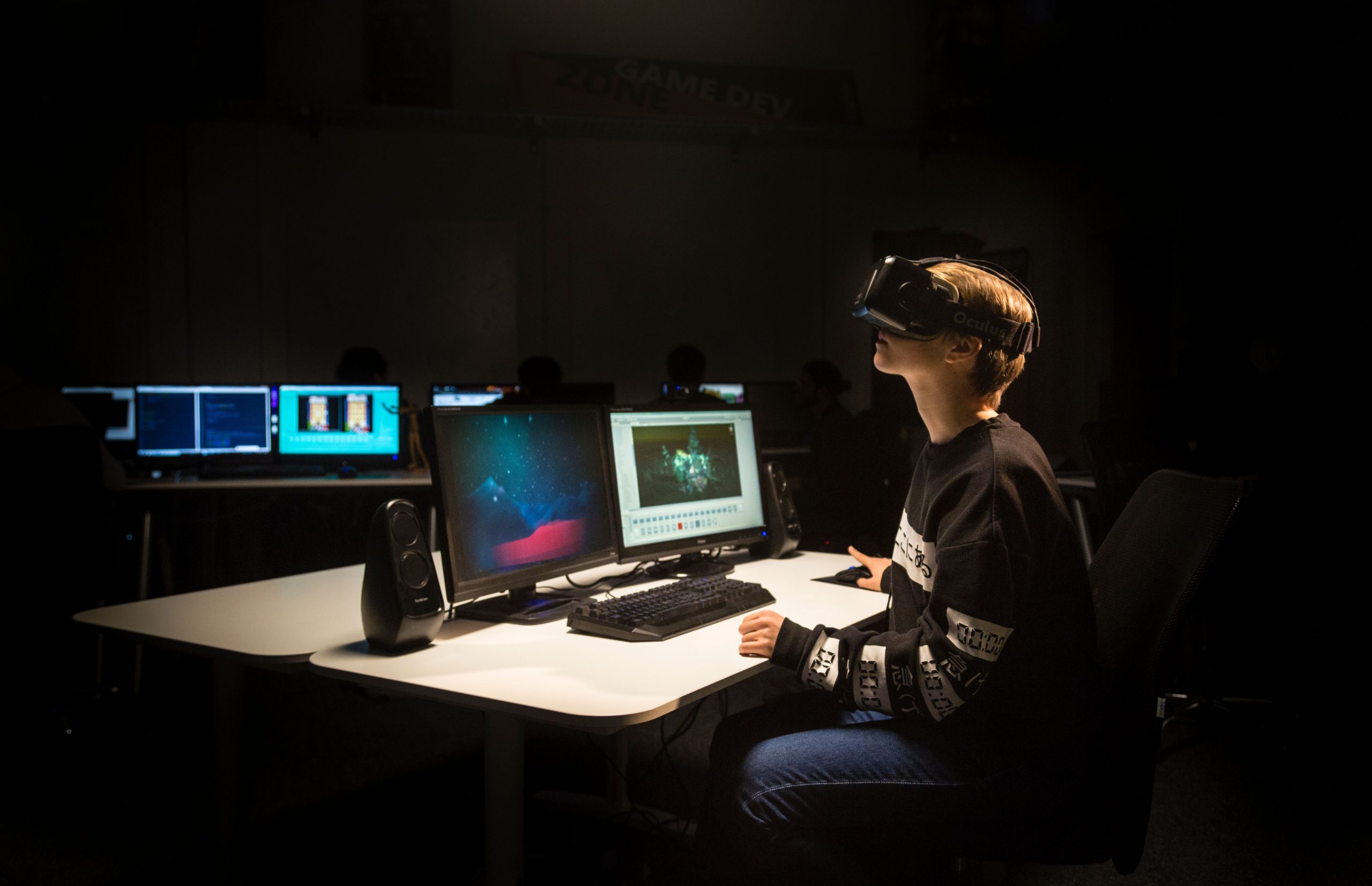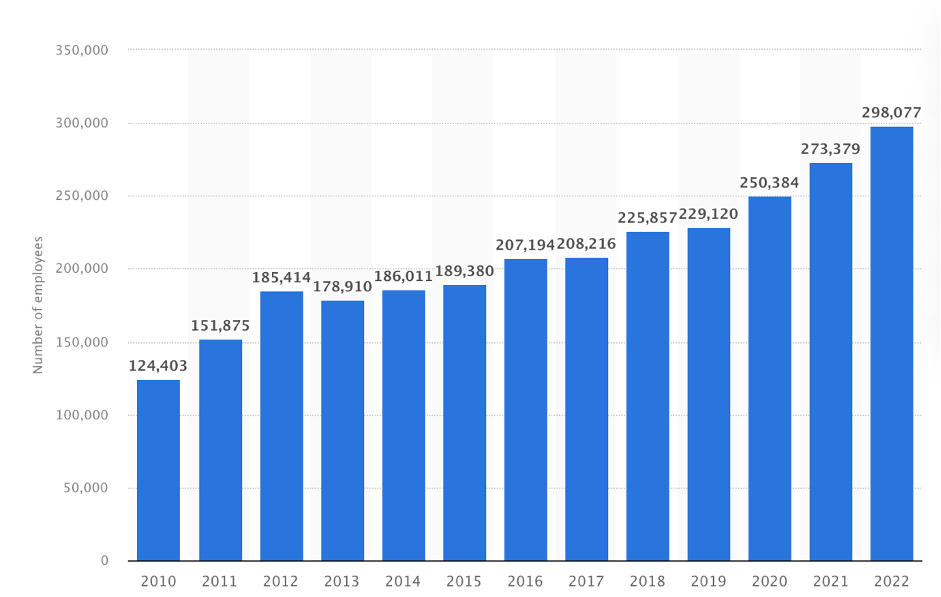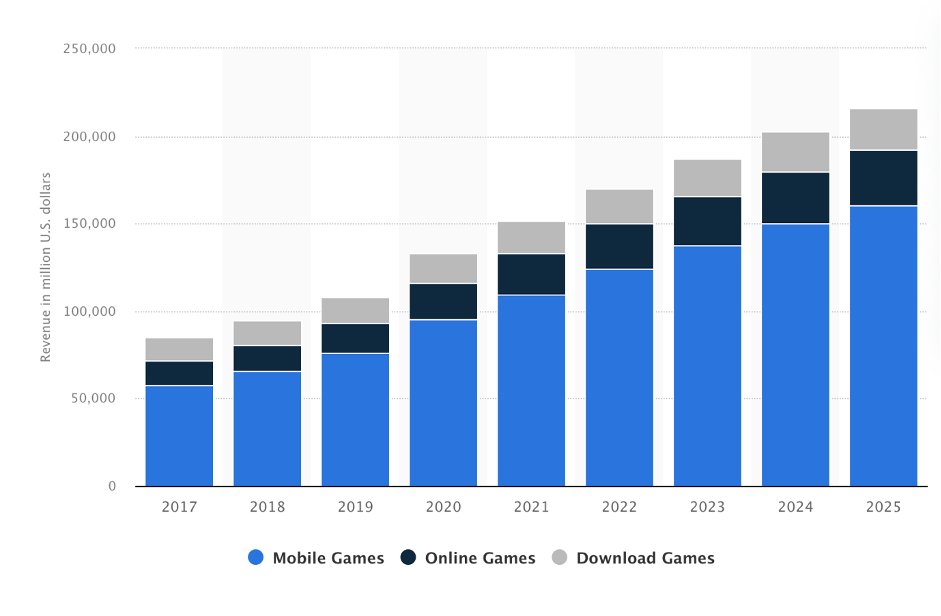Game development is a hot topic.
Between the ever growing market for games, and the snowball of technology rapidly gathering pace – it’s a great time to be in involved in the industry.
In this post, we go through everything you need to know about game development. Plus some of the most frequent game dev queries we hear.
But first, the big question…
What is Game Development?
In a nutshell, it’s the process of designing, creating, and releasing games for a variety of platforms. Of course, there’s a lot of moving parts to this. And there’s different ways to define the overall process.
One good way is break Game Development into the following:
- Scenes & Cameras
- Assets
- Code
- System
Note, the above is a good summary of the overall technical assets behind game development. However, this is somewhat different to stages of game dev (as we will see) to make it a reality.
What are the Stages of Game Development?
There are 7 key stages involved in game development. In a nutshell, they are:
- Initial Idea or Concept
- Scope
- Pre-Production
- Production
- Testing
- Release
- Post-Production

Each stage is fundamental to the overall success of a game development project. And while each stage is more or less sequential; there can be some jumping back and forth.
For example Stages 1-7 could look something like the following: (although in realtiy, there’s a lot more to it than this!)
- You brainstorm ideas for new game concepts and mechanics. You do your due diligence and market research (Initial Concept).
- You outline budget, team size, schedule etc plus secure funding (Scope).
- You align the initial concept with the new reality (pre-production).
- You design levels or storylines for the game. You create the artwork and assets needed for the game design. You programme the game logic using tools like C++ or Java script. (Production)
- You then test and refine the game to ensure it meets high standards for gameplay quality and visual appeal (Testing).
- Next you launch the game onto various platforms or systems (Release)
- And finally, you continue to support the game with post-release content updates and patches (Post Production)
Obviously, one person does not do all the above. It’s a team effort. For a full breakdown – check out our post on the stages of Game Development here.
What does it take to be a Game Developer?
A lot! To make it as a game developer, you’ll need a wide range appreciation of game design, coding and programming, 3D modelling and animation, game testing, quality assurance, marketing and distribution, (and more!).
Now that doesn’t mean you are a master at all of them. But… you do need to know how the all the moving parts fit together.
If you are a game developer, programming will likely be your forte.
As there are different stages to game development, there are different roles and personalities along the way.
In the game dev journey, you must also take into account the people you’re reporting to and collaborating with. Whether that’s your company superiors, potential investors or colleagues – there’s people who want to know what the plan is. For this reason, developing your soft skills (communication) is key to this career.
What specific skills do you need for Game Development?
As mentioned, there’s a wide range of skills needed for game development (both technical and soft skills). Depending on the type of role you want to play in the game development process this will determine what to focus on. So for example, If you’re interested in being a game designer, you’ll need strong creative and storytelling abilities, as well as experience with game design software; for example Unity or Unreal Engine.
If you’re more interested in the game dev side – programming is a must. You’ll need to be proficient in languages like C++ . 3D artists and animators will need to be skilled in programs like Maya or Blender, while game testers will need strong analytical and problem-solving skills.
Overall to win in this field – you’ll also need to have excellent communication and teamwork skills. Plus, the ability to stay organized, manage multiple projects at once, and meet strict deadlines.
Whether you’re working on your own or as part of a larger development team, having a passion for games is also essential in order to thrive in this fast-paced industry. A little intimidating but also exciting right?

What is Games Development Pipeline?
Games Development pipelin is simply the stages of Game Development. From concept to seeing that game on the shelf and ready to buy (a beautiful feeling!!).
As mentioned, there can be overlap between these different stages of game development. Sometimes tasks from one stage may need to be revisited or tweaked as the development progresses. (Of courses, In a perfect world – the pipeline is sequential – but things are rarely perfect!)
For example, you may come up with a great game concept but realize during the design phase that it isn’t feasible to create. Or you may create some amazing artwork for your game, only to find out during programming that it doesn’t fit with the game mechanics you’ve developed.
It’s important to be flexible and adaptable when working in game development, as even the best-laid plans can change at a moment’s notice.
What are the different types of game genres?
There are many different genres of games, ranging from first-person shooters (FPS) and role-playing games (RPGs) to puzzle games and strategy games. Some games may also combine multiple genres, such as action-adventure games that blend elements of both action and adventure games. The type of game you develop will likely be dictated by the game concept you come up with, as well as your own personal interests and skills as a developer.
That being said, some genres are more popular than others, and certain genres tend to be more profitable. For example, FPS games and battle royale games are currently very popular. In terms of game development, these are all important considerations – particularly in the early stages of Game development – (initial concept & Scope).
If you’re looking to make a game a commercial success – it’s important to know the market’s tastes. Or maybe there is an untapped niche ready to explode in Gaming? Either way, by knowing and studying the business landscape – you can plan effectively.

Can you learn Game Development without code?
In short, no.
Game development is a very technical field, and code is an integral part of the game development process. That being said, you don’t need to be a coding expert to get into game development – even beginner-level coding knowledge can be enough to get started.
Nor is code, the only factor in Game Dev (as above -there are many different facets to the overall Game Development process). But if you want to be a game developer – code is a big part of the territory.
(*Note: You can in theory, make games without programming knowledge. It’s just if you are going to make a career as a games developer – coding is a necessary part of the puzzle.)
So, if you’re interested in game development, but don’t know how to code, your best bet is to start by learning some basic coding concepts.
Once you have a grasp on the basics of coding, you can then start applying these concepts to game development. There are many resources available online that can help you learn how to code – so don’t be afraid to do some research and find the ones that work best for YOU!
So what are the best languages to learn for game development?
Some of the best to start with would be C++ or C#. Both of these are among the most likely languages you would face in a big commercial game engine. Almost all the internals of every major game engine will be written in C++, so it’s going to be difficult to not know C++, unless you can stick 100% to scripting for your projects. So C++ is definitely a powerful one to start out with, for creating low-level programming and optimization.
That said, when you’re starting out, choosing an ‘easier’ language could be a good place to begin. Managed languages like C# are a little easier to learn, because they hide some of the complicated concepts and do a little more of the work for you. Ultimately, the best game development language for you, depends on your specific needs, preferences and where you are in your journey.

Is Game Development Easy?
Game development is not easy. But it’s not impossibly difficult either.
It is a complex process that requires a wide range of skills and experience. However, if you’re passionate about making games AND willing to put in the hard work.. it can be an extremely rewarding career.
If you’re just starting out in game development, it’s important to get as much experience and education as possible. There are many online resources and game development courses available that can help get you up to speed. Once, you’ve a strong understanding of the game development process: you can start to specialize in one or more areas.
Are Games Developers in Demand?
Yes! Game developers are in high demand all over the world. The gaming industry is growing at a rapid pace, and there is a constant need for new and innovative games.
Games developers who are able to create original and exciting games that appeal to a wide audience, are highly sought after by game publishers and studios.
Take a look at the growth in employees in the video games industry in the US from 2010-2022.
It’s a massive growth – 139% over the 12 year period.

Source Statista.
And what Game Development Opportunities in Ireland?
Yes there are many opportunities here also. While it’s a smaller market – there are many great roles out there. Head on over to LinkedIn to get a sense of the options available

Is Gaming a Good Career?
Absolutely! Gaming is very good career once you have some experience. Games developers can do well financially, especially if they create popular and successful games. In addition, game development is a very creative and rewarding field; allowing you to express your passion for game design, while creating fun and engaging gameplay experiences for players all around the world.
As above, there is demand with many opportunities out there. However, there’s also a lot of competition.
It makes sense? Working on video games and bringing them to life is the dream for many gaming enthusiasts. So yes it’s a good career – but you will also have to earn your place at the table.
Do Game Developers get paid well?
Yes, game developers can earn a lot of money, especially if they create and work on the big projects. As the gaming industry is growing at a rapid pace – there is a constant need for new and innovative games.
However, like most fields – your compensation is largely determined by your experience level. As your experience and skillset grows – so too will your earning opportunity. The hardest part is getting started on the ladder. (That’s not to say – you can take your foot off the gas once you’ve started. The best are always learning and upskilling to improve themselves!)
Start My Career in Game Development Today
Is Third Level Education necessary to be a games developer?
There is no one definitive answer to this question, as game development can be a highly specialized and individualized field. Plus, the goal posts to entry are continually evolving.
Some game developers may choose to pursue a degree in game development or computer science, while others may opt to learn on the job or through online courses and tutorials.
Generally speaking, most working in the field have a game design degree or related qualification. Having a strong foundation in game dev principles and programming is extremely beneficial for aspiring game developers.
Of course, the most important part is having the skillset. You don’t need a degree per se to get this skillset, but the right course can definitely speed up your learning curve in acquiring the skillset.
Whether you decide to go to third level or not, it’s vital to have a solid understanding of game design, gameplay mechanics, coding languages, testing and optimization techniques, marketing strategies, and more.
Do you need a portfolio for game Development?
Technically no, but in reality.. absolutely! While the requirements for game development jobs can vary from employer to employer – you’re going to be at a major disadvantage if you don’t have one. Even in the scenario where it’s not a ‘requirement’ – your competition (ie the other candidates) will likely have one.
Game development like so many emerging fields – has a ‘show me don’t tell me’ philosophy when it comes to hiring. It’s great to have a nice CV. But it’s even better to show some practical work and how you can positively impact the employer. (This is especially true when you’re starting off and low on the experience side)
A portfolio shows your technical chops but also it says: ‘I’m the kind of person that can take the initiative and get things done’. So yes, if you want to give yourself the best possible chance, you need a portfolio for game development.
What should be in a Games Development Portfolio?
In a simple terms – your best work.
Show the best of what you got to offer – whether that be game prototypes, level designs, gameplay mechanics, or any other projects you have completed. It should also showcase your skills and experience, highlighting things like your attention to detail, your understanding of game mechanics and design principles, and your creativity and problem-solving abilities.
If you’re interested in game development and want to build a successful career in this field, then it’s important to start building an impressive portfolio as soon as possible. With a strong portfolio, you’ll be well on your way to landing your dream job in game development!

What is the Best Game Development Software?
There is no one “best” game development software, as different tools and programs may be better suited to different types of game development projects. Some popular options include Unity, Unreal Engine, GameMaker Studio, Construct 2, and many others.
When choosing a game development tool or program, it’s important to consider your budget, level of experience, game type and genre, project requirements, and more.
You should also research online reviews from other game developers. By learning more about the pros and cons of various game development software programs – you can make an informed decision about which one best suits you. With the right tools and programming skills, however, you can create exciting and engaging games for players all around the world.
2D vs 3D
Again, there is no right or wrong answer as the 2d vs 3d animation debate is well known in animation circles. It really depends what you find enjoyable as both have their place. While this is absolutely not set in stone, 2D tends to match the more artistic types whereas 3D, the more mechanical mind. However, animation (even if we consider it as a sub-branch of game dev) is multidisciplinary and that you can learn from different fields in and out of animation. For this reason, when you’re starting out – try both!
What to look for in a games development course?
There are a number of factors to consider when looking for a game development course, including the course curriculum, instructors and teaching staff, student resources and support, location, cost and budget, and more.
One important consideration is the course curriculum itself. Ideally, a game development course should cover topics such as game design theory and principles, game mechanics and dynamics, gaming platforms and technologies, graphics and animation techniques, game testing, narrative writing, project management skills and of course a little of the business side. (And yes our games development course covers all these aspects!)
Another key factor to consider when choosing a game development course is the qualifications of the instructors or teaching staff. Look for instructors who have extensive experience in the game development industry as well as strong teaching skills that can help you build up your game development knowledge. Ie do they practice what they preach?
At Pulse, we provide exactly that. Check the vid below on our course.
What is the Best Game Development Software?
There is no one “best” game development software, as different tools and programs may be better suited to different types of game development projects. Some popular options include Unity, Unreal Engine, GameMaker Studio, Construct 2, and many others.
When choosing a game development tool or program, it’s important to consider your budget, level of experience, game type and genre, project requirements, and more.
You should also research online reviews from other game developers to learn more about the pros and cons of various game development software programs so that you can make an informed decision about which one best suits your needs. With the right tools and programming skills, however, you can create exciting and engaging games for players all around the world.
What to look for in a games development course?
There are a number of factors to consider when looking for a game development course, including the course curriculum, instructors and teaching staff, student resources and support, location, cost and budget, and more.
One important consideration is the course curriculum itself. Ideally, a game development course should cover topics such as game design theory and principles, game mechanics and dynamics, gaming platforms and technologies, graphics and animation techniques, game testing, narrative writing, project management skills and of course a little of the business side. (And yes our games development course covers all these aspects!)
Another key factor to consider when choosing a game development course is the qualifications of the instructors or teaching staff. Look for instructors who have extensive experience in the game development industry as well as strong teaching skills that can help you build up your game development knowledge. Ie do they practice what they preach?
At Pulse, we provide exactly that. Check the vid below on our course.
What is the history of game development?
The history of game development is a long and storied one, dating back to the earliest days of computing. One of the first game developments was the iconic game-maker “Pong”, which was created in 1972 by Atari.
Since then, game development has become increasingly complex and sophisticated, with more advanced programming languages, game engines, graphics technologies, marketing strategies, and other tools becoming available over time. Today, there are thousands of talented game developers working all around the world to create exciting new games for players of all ages.
What does the future hold for game development?
The future of game development is looking very bright indeed. If recent years are anything to go by, the upward demand trend for video games is set to continue.
Forecast of Video Games revenue by segment in the World from 2017 to 2025

The chart above makes sense right?
The genie is out of the bottle.
People love quality video games and the demand is clearly there. So, what could reverse that trend? – Barring the next big thing? (But then again, that would be just another continued evolution of gaming). People have and always will enjoy games. It’s human nature.
So, as tech such as AI, VR and more continue to evolve , so too will game development. This all makes for a very exciting time to jump into this career.
What are Game Engines?
A game engine is a software platform that provides the tools and infrastructure needed to create and deploy video games. These engines are typically comprised of a range of different components, including game logic, graphics, physics, audio, animation, artificial intelligence, networking, and more.
There are many different game engines available today, each with its own set of features and capabilities. Some popular game engines include Unity and Unreal Engine 5. Whether you’re developing 2D or 3D games, there is likely a game engine out there that will meet your needs.
So if you’re interested in game development… and want to learn more about game engines, then start exploring the various options out there – you’re sure to find one that’s right for your project.
How to choose the right game engine?
There is no one-size-fits-all answer to this question, as game engines can vary widely. That said, some factors that you may want to consider when choosing a game engine include:
- Game’s genre and platform
- Skills and experience of your team members
- Budget
To get started with narrowing down your options, you may want to ask other game developers for recommendations. Or do some research online to see what game engines are most popular among developers in your niche. You can also try out different game engines through free trial versions or demos to get a better sense of their strengths and weaknesses.
With so many game engines available today, choosing the right one can seem like a daunting task.
Bottom line: Take the time to consider your needs and do your research, and you will find an engine that’s a good fit for your project.
How do you prototype complex games?
Game prototyping can vary widely. However, common strategies for prototyping complex games include using game development tools like Unity or Unreal Engine, developing game prototypes iteratively instead of all at once, and collaborating with a team of game designers and developers.
(Like anything; If you break down into small tangible steps – the perceived ‘mountain’ becomes a lot more scalable – taking each hill one at a time)
Additionally, you may want to experiment with different game mechanics and design elements until you find something that works well for your project. And finally, it’s important to keep in mind that game prototyping is an ongoing process – even after your initial prototype is complete, there will likely be further tweaks and adjustments down the road.

What is a Games Design Document?
A game design document is a written document. It outlines the game’s concept, mechanics, story, target audience, story, game mechanics, level design, art style, and other features.
The game design document should be created during the ideation (initial concept) stage of game development. Once it has been completed, it can be used as a guide throughout pre-production, production, and post-production. Think of it like a blueprint that everyone can refer back to!
Other Game Development Terms
Worldbuilding
This is a game development concept. Worldbuilding involving the creation of game worlds that players can explore and interact with. Some common game world elements include terrain, landscapes, biomes, weather conditions, population, cities and towns, art styles and visual themes, etc.
For game developers who are looking to create compelling game worlds for their players, worldbuilding is an essential part of game development. With careful attention to detail and a strong understanding of your target audience, you can create game environments that truly immerse your players in the experience.
Level design
Level design is the process of designing game levels, environments, and challenges. Level design is a crucial part of game development and can make or break a player’s experience.
A well-designed game level should be fun, challenging, and rewarding for the player. Not too easy. Not too hard.
It should also fit within the game’s overall theme and narrative. When designing game levels, game developers must take into account the game’s mechanics, story, art style, and other factors.
Game Development vs Software Development
The main difference between game development and software development is that game development focuses specifically on game design, while software development is more general.
Game developers are responsible for creating the game concepts, mechanics, and content that players interact with. This can include designing game levels, characters, and challenges; writing game narratives and storylines; developing art styles and visual themes; etc. Software developers, on the other hand, typically focus on much broader areas like programming, software architecture, app development, web development, etc.
So if you’re passionate about game development and want to create amazing games for players around the world to enjoy, then it’s important to understand the differences between the two.

Game Development vs App Development
Again, The main difference between game development and app development is that game development involves the creation of games, while app development focuses on the development of software applications.
Beta testing vs Soft Launch, are they mutually exclusive?
While this can vary, generally speaking – beta testing and soft launch are not mutually exclusive. In other words, it is possible to do both at the same time.
Beta testing is typically used by game developers to test game functionality and performance before releasing their game to the general public. This may involve testing features like game controls or network connectivity or gauging how different gameplay elements impact game balance.
Soft launch, on the other hand, is primarily used for market research purposes. It allows game developers to release an early version of their game in a specific region, in order to collect data about player engagement and monetization .
Ultimately, whether you choose to focus on beta testing or soft launch will depend on your specific game’s needs and target audience.
Final Words on Game Development
Game development is an ever-growing and developing field. While it’s competitive to begin, there are many great opportunities out there. Don’t let the competition & popularity deter you.
If you have a real passion for gaming and a hunger to learn – it could be the perfect career for you..
Ready for the adventure ?
